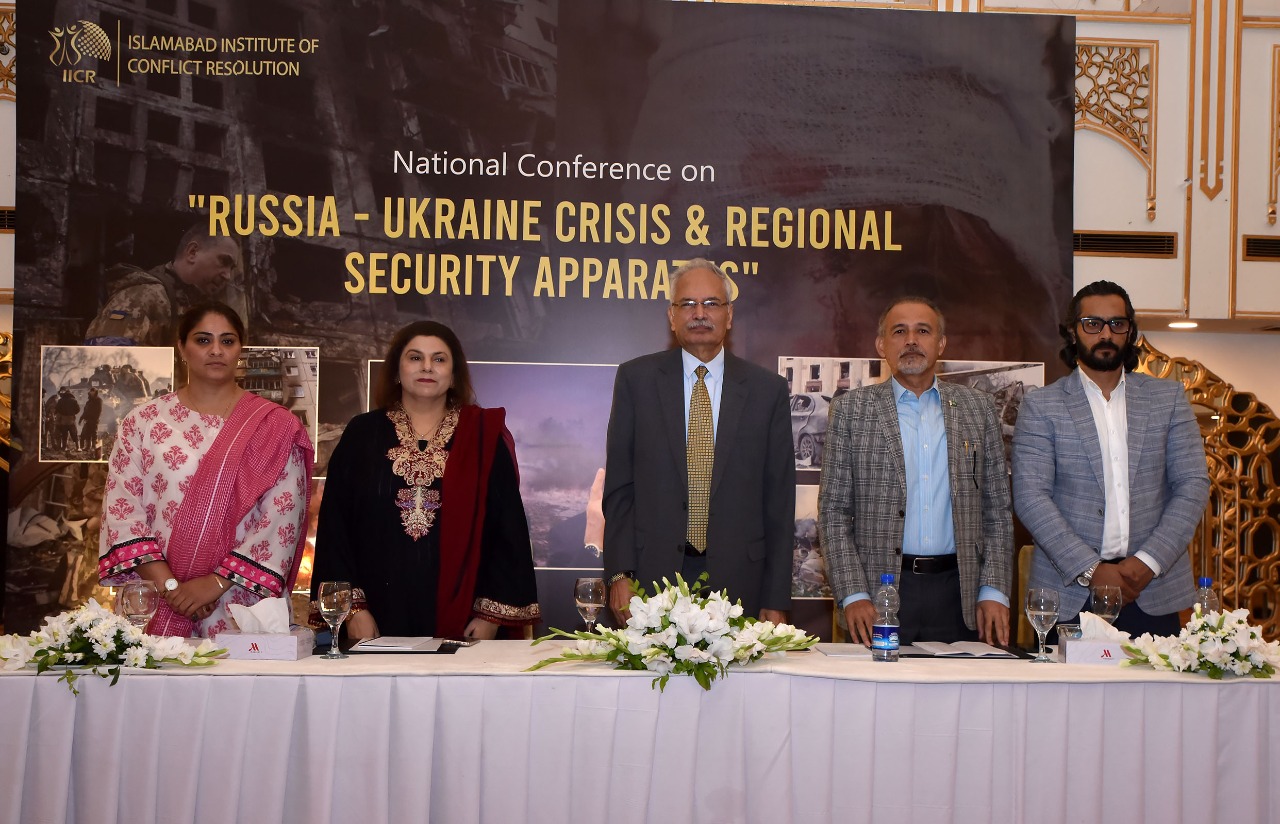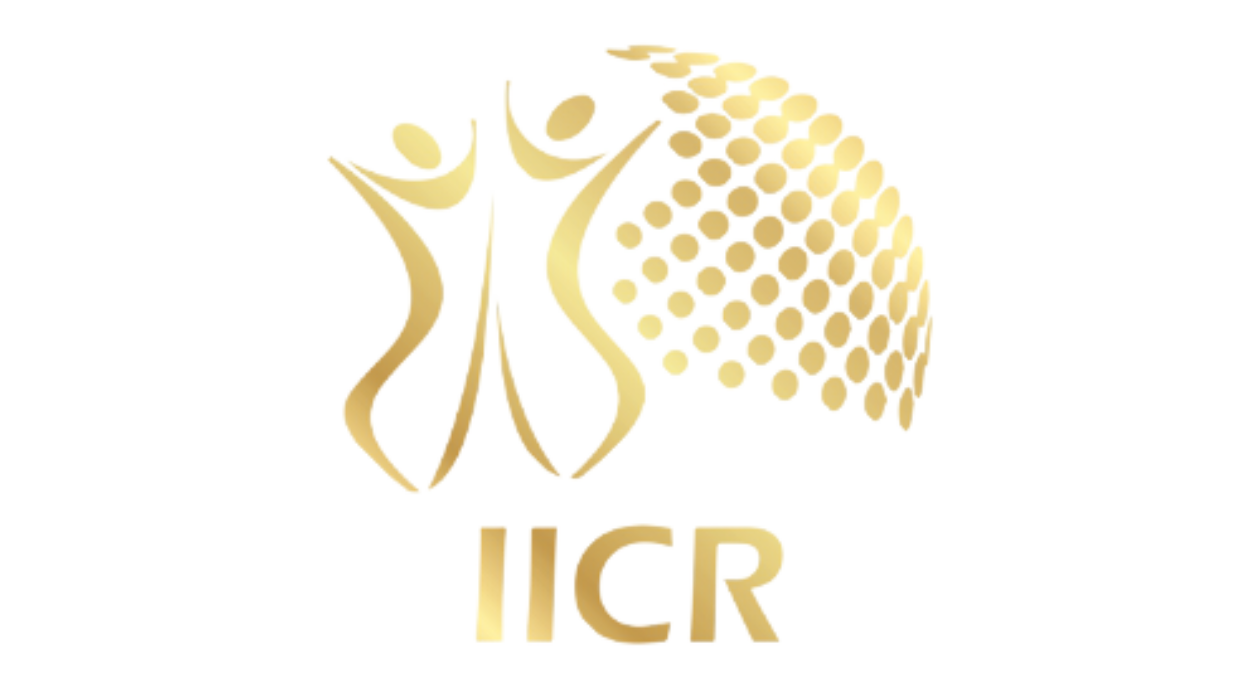
Russia-Ukraine Crisis & Regional Security Apparatus
On Monday September 19, 2022. Islamabad Institute of Conflict Resolution (IICR) organized a National conference titled “Russia-Ukraine Crisis & Regional Security Apparatus” The eminent speakers included Prof. Dr. Rifaat Hussain, HOD Governance and Public Policy NUST, Dr. Shabana Fayaz, HOD Department of Defence and Strategic studies QAU, Prof. Dr. Azhar Ahmed, Faculty Department of Humanities and Social Sciences, Bharia University Islamabad, Mr. Nasir Qadri, Executive Director Legal Forum for Kashmir, and Mr. Shahid Raza, Defence Analyst.
The first speaker on the panel was Prof. Dr. Rifaat Hussain, HOD Department of Governance and Policy NUST, while speaking to the audience Dr. Hussain highlighted the historical and geographical context of the Russian-Ukraine conflict and said that Russians were apprehensive of NAT’s eastward expansion which is the precursor of Russia-Ukraine crisis. Adding further on geo-political aspect of the conflict Dr. Rifaat said that Sino-Russia strategic partnership is to reduce the US led hegemonic order which has come out in open after China has shown readiness to help Russia in order to ensure multipolar world order. it is important to note that China has also refrained itself from providing military support to Moscow, said Dr. Hussain. In his concluding remarks Dr. Hussain said that sanctions on Russia have enabled Beijing to take foothold of Central Asian states and China can simultaneously support Russia in its aggression and can also carry on with the global economic vision to alter the global order.
The next speaker on the panel was Dr. Azhar Ahmed, Faculty member Department of Humanities and Social Sciences Bharia University. Speaking to the audience Dr. Azhar said all conflicts have political and economic consequences and the world is facing one in shape of Russia Ukraine Conflict. Adding further he said that it is in-fact a proxy war between Russia and west and an important aspect in global transition from west to east. Talking about economic aspect of the war Dr. Azhar said that around 1.2 billion people are vulnerable to food energy and Russia and Ukraine are the food basket of world which is currently burning. Apart from food resources both Russia and Ukraine are supplier of crude oil and fossil fuels Russia being the major one. And because of the current war between both countries the world is facing shortages and supply chain disruptions of not only food supplies but also energy. While west is pushing hard to strangle Moscow it has created some ripples for Russia as well. About 1000 international companies left Russia and Russian economy is being hit by 15 percent decline however, if west looked to isolate both Beijing and Moscow it has been disappointed greatly remarked Dr. Azhar. In concluding remarks Dr. Azhar said that Pakistan has also far-reaching consequences of the conflict. It has maintained moderate position in the conflict as Pakistan needs both one for food and the other for energy resources. Pakistan currently is compelled to purchase expensive energy and situation might get grimmer in coming months with more inflation in Pakistan.Dr. Shabana Fayaz, HOD, Department of Defence and Strategic Studies, QAU. She talked about the realist aspect of Russia Ukraine war and how great power politics is steering the global order but it is the human security which is the ultimate victim of it. The war is transforming the both traditional and non-traditional security order of Europe. Adding further Dr. Shabana said that that rathe cooperation and integrating Russia into European security apparatus, Moscow became at the crosshairs of western security apparatus. Talking about the China-Taiwan issue Dr. Fayaz said that the Taiwan appears to be a flashpoint between China and the US where China considers Taiwan to be its territorial part and upholds principle of its “re-unification”. Whereas, US has long maintained a policy of “strategic ambiguity”. Adding more she said that China could attempt to bring about “reunification” by non-military means such as strengthening economic ties while US will continue to support Taiwan militarily.
The next speaker on the panel was Advocate Nasir Qadri Executive Director LFK. While talking about NATO’s emergence Mr. Qadri said that NATO was founded amid cold war in 1949 on the basis of Mutual Assistance in the event of aggression against Soviet Union. However, despite dissolution of Soviet Union in 1991, NATO has since undergone stages of expansion. Adding further he said that the alliance added more eastern bloc countries in late 90s and early 2000. The Baltic countries of Estonia, Latvia and Lithuania on the Northern end of Russia’s western border joined NATO in 2005, thus objective of containing Russia advanced. In his concluding remarks Mr. Nasir said that at a landmark summit in Madrid on June 28-30, NATO unveiled a new once-in-a-decade Strategic Concept—its broad mission statement—amid a radical beefing up of defenses, raising its Rapid Response Force from 40,000 to more than 300,000 troops. Russia, unsurprisingly, was picked out as “the most significant and direct threat to Allies’ security, though China—some 3,700 miles from the Atlantic—was also named as a source of “systemic challenges”. Now, the bloc is expanding its remit under U.S. direction to include containing a resurgent China and Russia.
The last Speaker on the panel was Mr. Shahid Raza, Security Analyst. Speaking to the audience Mr. Raza said that the current conflict between Russia and Ukraine is not classified as war because the number of resources associated with the outbreak of war are not been committed by either side. This conflict was made inevitable due to many reasons and the most important reason is the expansion of NATO toward eastern Europe and the Russian Border. Adding further he said that the European union is trying their best to internationalize the conflict however the European union is dependent on Russian energy resources. Reflecting on Pakistan Russia relations he said that in the past 20 years Russia and Pakistan have maintained relations very carefully. And China has a great role in ties between Russia and Pakistan. In his concluding remarks he said that most of Pakistan’s weaknesses are economic in nature and the economy is the single biggest reason why Pakistan find itself squeezed between the east and the west. Pakistan should adopt a policy of armed neutrality. It must maintain its strategic relevance in the region.
The conference was then followed by Q&A session and concluding remarks by Prof. Dr. Rifaat Hussain.
